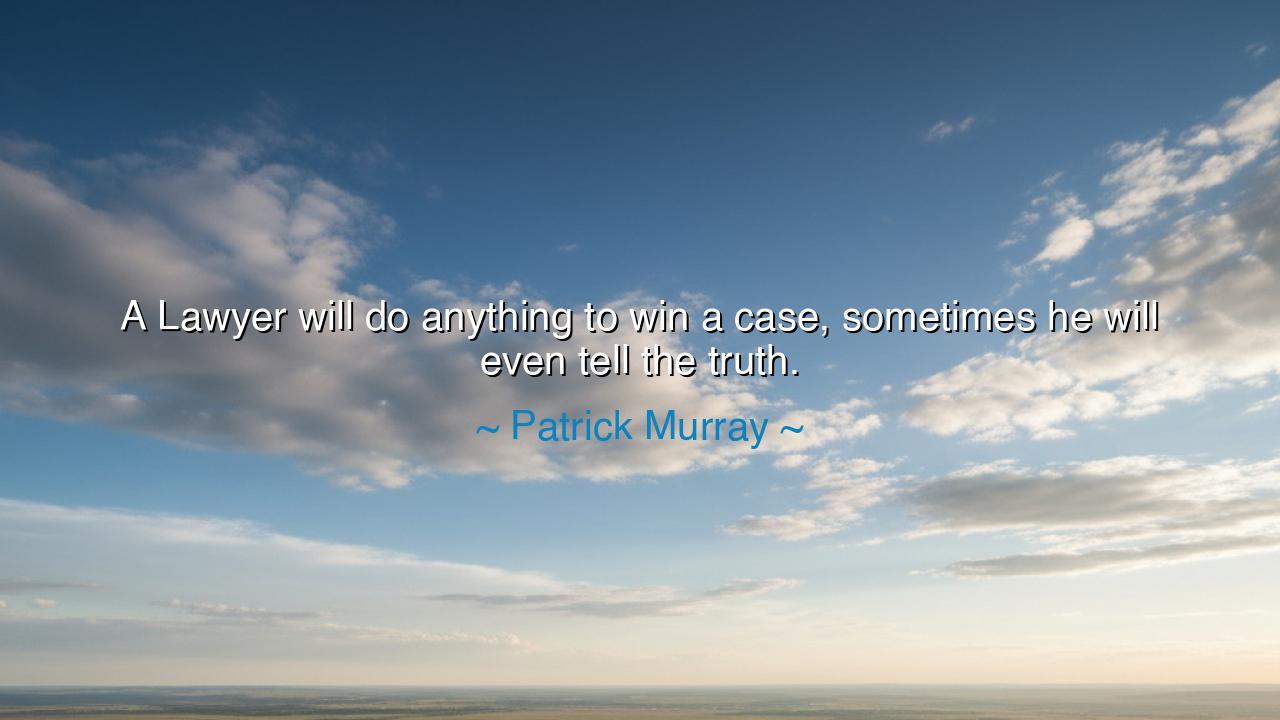
A Lawyer will do anything to win a case, sometimes he will even






“A lawyer will do anything to win a case, sometimes he will even tell the truth.” Thus Patrick Murray speaks, with wit sharp as a blade and irony thick as storm-clouds. At first, his words seem to mock, to jest at the noble profession of the law. Yet beneath the laughter lies a deeper sting. For here he reveals a paradox of human striving: when ambition to win eclipses devotion to truth, even honesty becomes a tool of convenience rather than a sacred duty.
From the days of old, men have wrestled with this tension. The Greeks told of sophists, masters of argument who trained their tongues not to uncover the truth, but to twist it into whatever shape would bring them victory. Against them rose Socrates, who declared that to value victory above truth is to betray the soul itself. His life was testimony to the higher calling: he preferred death with truth to life with lies. Yet the sophists flourished still, for the world has always hungered more for winning than for wisdom. Murray’s jest shines a torch into this ancient conflict, exposing how the truth is often used not as a guiding star, but as a weapon chosen only when it suits the warrior’s cause.
Consider the tale of Cicero, the Roman orator and lawyer. He was unmatched in rhetoric, and many times he bent the ears of the Senate not with calm fact but with cunning persuasion. Yet in the trial of Catiline’s conspirators, Cicero spoke with both eloquence and truth, revealing the treachery that sought to overthrow Rome. Here, truth was convenient, for it carried the weight of victory. But in other trials, the truth was bent, adjusted, or buried beneath the thunder of words. Cicero’s greatness was real, but so too was the shadow that followed him: a reminder that in the hands of ambition, even truth may be wielded as a weapon of strategy rather than a standard of virtue.
Yet we must not despise the whole profession for the weakness of men, for the law is itself a noble thing. Its purpose is not victory but justice. When lawyers cling to victory above all, the law decays into a battlefield of rhetoric. But when they cling to truth, even at the cost of loss, they become guardians of civilization itself. For justice cannot breathe without truth; it suffocates beneath the weight of deceit. Murray’s saying is not a condemnation of law itself, but a warning: when truth is used only as a convenience, the very foundation of justice trembles.
This lesson resounds not only in courts but in all of life. For every man and woman is tempted to treat truth as a tool, to use it when it helps their cause and to hide it when it hinders. Politicians flatter themselves, merchants conceal their faults, even friends may shade the truth to avoid discomfort. But the wise know that to treat truth as a weapon or ornament is to dishonor it. Truth must be the foundation, not the strategy. It must be the goal, not the means.
Therefore, children of the future, take heed: do not use truth as a mask for ambition. Speak it whether it serves you or not. Let your loyalty be not to winning, but to justice; not to comfort, but to reality. For victory without truth is hollow, like a palace built on sand, but defeat with truth preserves the soul. Better to lose with honor than to triumph with deceit.
Let this be your practice: when confronted with conflict, ask not, “What will make me win?” but “What is true?” And let your lips speak only that, even when it wounds. For in the end, the victory of truth is the only victory that endures. Murray’s words, clothed in jest, bear a grave reminder: ambition without honesty corrupts, but honesty, even when inconvenient, sanctifies. And in choosing the harder path, you become not only a seeker of justice, but a servant of truth itself.






VATran Van Anh
Patrick Murray’s quote plays on the idea that lawyers are always looking for an advantage. While it's a humorous take, it also highlights the sometimes manipulative nature of legal practice. But is it fair to generalize all lawyers this way? Aren’t there many lawyers who genuinely seek justice, even if it sometimes means losing a case? How do we distinguish between legal strategy and ethical behavior in the courtroom?
LANguyen Lan Anh
This quote made me laugh, but it also raises an important point. The idea that lawyers will do anything to win a case, even telling the truth, seems to speak to the lengths they’ll go to. It makes me think—how often is truth distorted in legal settings for the sake of winning? Does this reflect a deeper issue in how the legal system operates, where truth isn’t always as important as strategy?
TCChu Thi Chanh
Patrick Murray’s quote is both funny and thought-provoking. It implies that lawyers will use every tactic, even the truth, to win a case. But I wonder—does this suggest that truth in legal matters is secondary to victory? Is this a fair criticism of the legal profession, or is it simply a necessary part of the adversarial system that ensures fairness and representation?
TADuong Truong Anh
This quote seems to offer a cynical view of lawyers, suggesting that their primary goal is to win, even if it means telling the truth when it benefits them. But isn’t that the reality of advocacy? Lawyers are hired to represent their clients, and truth can sometimes be a weapon, just like any other strategy. Do you think this undermines the role of lawyers, or is it just a realistic portrayal of their job?